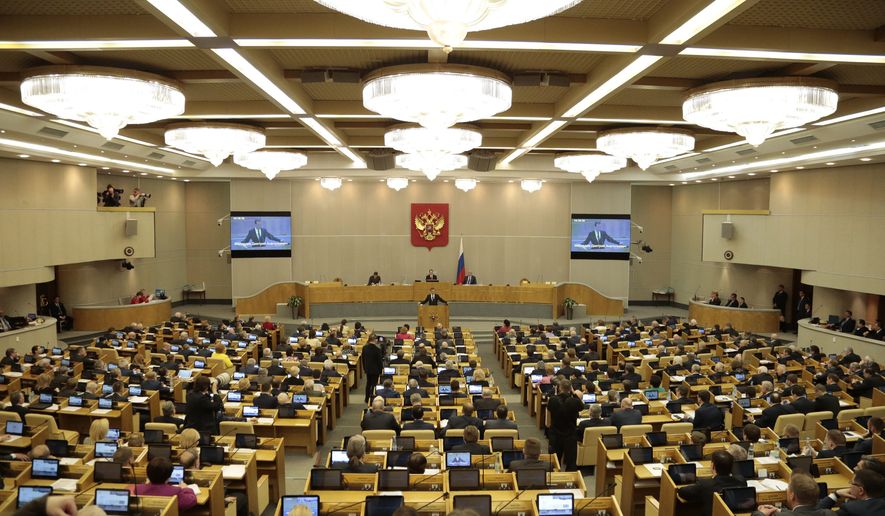Russian lawmakers are expected to move forward Friday on expansive legislation that would outlaw digital encryption, force internet and phone companies to record their customers’ communications and impose new penalties on individuals accused of participating in unsanctioned protests, among other measures.
The comprehensive package of proposed anti-terror rules was drafted back in April by the chair of the State Duma Committee for Security, Irina Yarovaya, and is expected to be brought to a vote this week after already gaining preliminary approval from lawmakers, the Meduza news portal reported Wednesday.
If Ms. Yarovaya’s package is approved — a near certainty, according to the news site — then Russians could soon be subject to sweeping new laws significantly affecting free speech and expression.
Among the items included in the proposal is a measure that would require telecommunication companies, as well as “organizers of online information distribution,” to record and maintain copies of all phone calls, text messages and other communications sent or received within Russia. Telecoms would have to keep those records for up to six months and provide them to authorities upon the request of law enforcement. Metadata containing raw information about those interactions would have to be kept on file for three years.
Russia’s largest mobile phone service provider, MTS, told a regional newspaper that requiring the company to keep voice information and other customer records on file for six months would likely cost upwards of 2.2 trillion rubles, about $33.8 billion.
“Our taxable profit for 2015 totaled 22.5 billion rubles ($364 million) and income tax totaled 4.5 billion rubles ($69 million). Taking the the expenses [on data storage] into account, we won’t be able to pay taxes on profit for about 100 years, and the budget will not receive 450 billion rubles ($6.9 million),” MTS representative Dmitry Solodovnikov told Kommersant.
Competing telecoms Megafon and Vimpelcom said they too would likely be unable to afford the cost of maintaining such infrastructure, The Moscow Times reported. Yandex, a Russian internet company, said the measure would increase expenses and cause an “excessive limitation of the rights of the companies and users.”
A second item included in the offering would aim to ensure Russians don’t skirt the proposed surveillance measure by forcing companies that encrypt digital communications to provide federal investigators with the keys necessary to decode their conversations. The law would apply to secure messages sent through services such as WhatsApp and Telegram in addition to web traffic protected by HTTPS — an industry standard protocol that’s used to safeguard internet browsing from eavesdroppers.
Entities that refuse to decode encrypted communications for police could risk fines reaching up to 1 million rubles, or around $15,000, Medusa reported.
Yet another provision would increase penalties for persons accused of using social media to incite terrorist activity and justify terrorism — “public statements recognizing the ideology and practices of terrorism to be [morally] correct, and something that should be supported and imitated,” according to Medusa’s English translation.
Individuals convicted of provoking terrorism on social media would face seven years in prison rather than five years behind bars under existing law. At least 54 people were sent to Russian prisons last year for hate speech violations, mostly in connection to charges related to social media postings, Moscow-based human rights group Sova said last month.
A third item included in the proposed legislative package would establish a minimum prison sentence of five years for individuals convicted of “inducing, recruiting, or otherwise involving” others in unsanctioned protests, Medusa reported.
Ms. Yarovaya has previously said her proposal was “substantial and targeted at prevention and protecting out citizens and state from terrorism,” government-owned media reported.
As of Thursday, more than 3,000 Russian citizens have signed a petition urging lawmakers to reject the bill, Global Voices reported.
• Andrew Blake can be reached at ablake@washingtontimes.com.




Please read our comment policy before commenting.